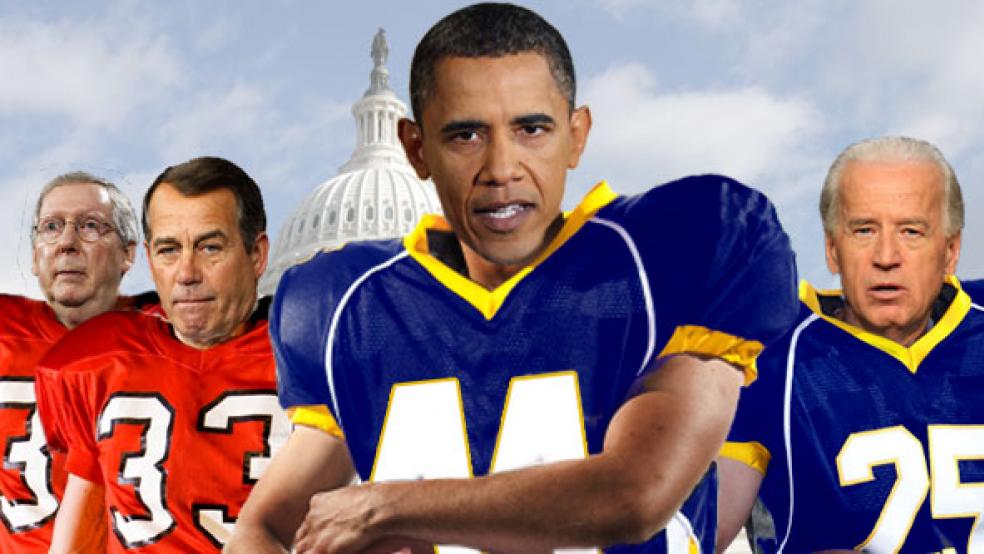You have to wait two long, hype-infested weeks before the Packers and the Steelers kick off Super Bowl XLV. But if you’re a fan of deficit politics, you only have to wait a few more hours for the Big One: State of the Union Address MMXI. President Obama will be calling plays against a Republican squad emboldened by a backfield of rookies acquired in the November draft and by a new sense that the GOP has the home field advantage.
The president’s speech won’t focus only on the federal deficit, of course, but its success or failure could well be decided by his handling of that explosive issue. Fear and posturing around the spiraling national debt dominated the election, and more than half of voters today say that reducing the deficit should be Washington’s top priority. Unlike the faceoff in North Texas on Feb. 6, however, this issue won’t be resolved in one night. And the stakes are, to put it mildly, considerably higher than who gets to go to Disney World.
The Weigh-In
If you’ll be keeping score at home, here’s a backgrounder to the Big Speech. Kickoff at 9pm Eastern Standard Time.
$14,056,313,474,932.58
Federal debt on January 20, 2011 ($14.1 trillion)
$ 119,953
Federal debt per American household
$75 million
Debt of the United States, 1791
$75 million
Approximate hourly increase in federal debt, 2011
app. 0 percent
Annual rate of increase in federal debt during Clinton Presidency
7.4 percent
Annual rate of increase in federal debt during G.W. Bush Presidency
18.4 percent
Annual rate of increase in federal debt during Obama Presidency
62 percent
Debt as a percentage of GDP, 2010
90 percent
Debt-to-GDP ratio at which interest payments on debt alone exceed all discretionary federal spending
2020
Year in which debt will reach 90 percent of GDP at current rate of growth, CBO projects
Trash Talk
The belly-bumping over who to blame for the deficit has been in full swing for months, and as of early January, it appeared the Republicans had a two-touchdown lead. After all, a good many fans in early November apparently agreed that Republicans hate, hate, hate reckless government spending while the Democrats can’t get enough of it. Then, when the Republicans took over the House locker room on Jan. 6, they declared that they were going to save the country from excessive debt and promised to cut an impressive $100 billion from the deficit before the year was out.
Faced with the actual sacrifice such a cut would require, however, the GOP called an audible. They would still cut $100 billion, they insisted, as long as the official scorekeeper did not count any offsetting increase in the deficit that might result from cutting taxes or from repealing Obama’s health care plan (even though, according to CBO, doing so would add $230 billion to the debt); nor would the Republicans cut any popular spending programs like defense or Medicare. Democrats promptly accused them of hypocrisy, innumeracy, bad faith, voodoo economics and an illegal receiver downfield.
Pregame Show
“Chairman Ryan will deliver the Republican address Tuesday night from the House Budget Committee hearing room, where the Democrats’ spending spree will end and the Republicans’ push for a fiscally responsible budget that cuts spending will begin.”
-House Majority Leader John Boehner, R. Ohio
“So much for cutting the deficit. Their first day on the job, Republicans [by extending Bush era tax cuts and threatening to repeal health reform] are already spending trillions more than they plan to cut … It makes you just shake your head and say, 'There they go again.'”
-Senator Chuck Schumer, D, N.Y.
“With all due respect to our Democratic friends, any time they want to spend, they call it investment, so I think you will hear the president talk about investing a lot Tuesday night.”
-Senate Minority Leader Mitch McConnell, R, Ky.
“The increase in the deficit was caused mainly by the conscious choices of Republicans — choices made, in part, under the false mantra that the Bush tax cuts would pay for themselves. They didn't. Not even close.”
-Mark Thoma, economist, University of Oregon
“Recent lawmakers have been spending like there is no tomorrow and no consequences. We must start immediately to reduce the deficit so the next generation is not left with a mountain of debt because of our spending mistakes.”
-Representative and Tea Party favorite Michelle Bachmann, R, Minn.
“2010 marked the emergence of a new, even more profound level of magical thinking [by Republicans]: the belief that deficits created by tax cuts just don’t matter. It’s an easy position to ridicule. After all, if you never have to offset the cost of tax cuts, why not just eliminate taxes altogether?”
–Paul Krugman, economist, Princeton University, and liberal New York Times columnist
“I have three priorities: Stop spending, stop spending, stop spending. It's all about stopping this ridiculous government spending.”
—Representative Jim Jordan (R, Ohio), chairman of the Republican Study Committee
“We are, I believe, witnessing something new in American politics. Last year, looking at claims that we can cut taxes, avoid cuts to any popular program and still balance the budget, I observed that Republicans seemed to have lost interest in the war on terror and shifted focus to the war on arithmetic.”
—Paul Krugman
Post-game Wrap-up
Even before the pundits are done dissecting the president’s words tonight, the U.S. will owe public debt holders and foreign entities tens of millions more dollars in interest. Presidents who promise to balance the budget in future State of the Union addresses will find their options fewer and uglier each year, unless we start soon. Time is running out.
2020
Year in which interest payments on the public debt will reach $1 trillion
2025
Year in which all federal revenues will be consumed by interest payments, Medicare, Medicaid, and Social Security alone. All other spending —f or defense, homeland security, transportation, energy, etc. — would have to be borrowed
185 percent
U.S. debt as a percentage of GDP in 2035, CBO projects
127 percent
Greek debt as a percentage of GDP, 2009
17.3 percent
Maximum government spending as a share of GDP consistent with achieving a balanced budget by 2035, assuming the government starts cutting deficits in 2015
12.1 percent
Maximum government spending as a share of GDP consistent with achieving a balanced budget by 2035, assuming the government starts cutting deficits in 2025
23 percent
Current government spending as a share of GDP
Eric Schurenberg is Editor in Chief of BNET, the CBS Business Network.
Related Links:
Justices Alito, Scalia, Thomas to Skip State of Union Address (USA Today)
Anticipating Obama's State of the Union as Edited for the New Civility (Los Angeles Times)
Tim Pawlenty on Bachmann's Planned State of the Union Rebuttal: 'It's Cool' (Washington Post)






